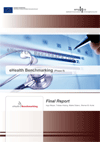Article of the Month!

This report presents the results of the eHealth Benchmarking study carried out by empirica on behalf of the European Commission, DG Information Society and Media. The study aimed to collate and analyse existing eHealth monitoring and benchmarking sources in order to identify best practice in data gathering and to develop a framework for an EU-wide eHealth Benchmarking approach.
The report is structured as follows:
- Chapter 2 presents the main outcomes of a search for eHealth monitoring and benchmarking sources in the 27 Member States of the European Union, Iceland, Norway, Canada and the United States of America conducted by the study.
- Chapter 3 brings together key lessons learned from 12 eHealth Benchmarking Good Practice cases in the areas of content, methodology, response rate and financing.
- Based on the analysis of the identified data sources, an indicator framework for eHealth monitoring and benchmarking is presented in chapter 4, covering key eHealth actors and eHealth-related activities.
- Finally, chapter 5 contains recommendations on how an eHealth Benchmarking approach covering the EU Member States and possible further countries can be implemented in practical terms.
Download eHealth Benchmarking - Final Report (.pdf, 1.697 KB).
Download from the eHealthNews.EU Portal's mirror: eHealth Benchmarking - Final Report (.pdf, 1.697 KB).
For further information, please visit:
http://www.ehealth-benchmarking.eu
Related news articles:
- empirica's Profile
About empirica
empirica Gesellschaft für Kommunikations- und Technologieforschung mbH (empirica) has many years of experience in quantitative and qualitative research methods. Its clients are private companies and public bodies: large and medium-sized companies in the insurance, pharmaceutical and automobile industries as well as software developers and hardware manufacturers. There are also telecommunications service companies and network providers, social services firms, medical facilities, Federal and State Government ministries in Germany and the European Commission as well as the European statistical office (Eurostat). For further information, please visit www.empirica.com.